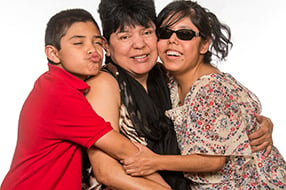Jump to topics on this page:

A child becomes a legal adult at age 18. That means many of their services will change. The help they get paying for those services will also change.
Some of those changes include:
The changes can be overwhelming, but you can start planning as early as birth. Here’s a list of changes to consider that’ll help you and your child transition smoothly.
Here are some programs your child might be able to get as an adult:
Your child may be able to get Medicare when they are 18 years or older if they have been receiving Social Security Disability Insurance benefits for at least 24 months.
Waivers are other services your child might be able to get. Most waiver programs are based on your child’s income, not the family’s income. Most of these programs have very long interest lists. We recommend signing your child up as early as possible, even if you aren’t sure they’ll need the services as adults. You can always decline the services when they get to the top of the list.
See our Waivers page to learn more about each program and how to sign up.
Some children who have been getting special education services can get job training to develop skills for independent living.
School districts can provide these services to your child from the end of their senior year until they turn 22. To get services, your child must graduate without enough credits for a recommended diploma. Also, these training services must be listed in their Individualized Education Program (IEP). These services are at no cost to your family. To learn more, see our Transitioning Out of Public Education page.
The Texas Workforce Commission also offers job training programs and pays for some assistive technology for adults with disabilities and special health care needs. If your child says they want to work as an adult, the Texas Workforce Commission can send counselors to your child’s Admission, Review, and Dismissal meetings starting at age 14.
When your child turns 18, most programs stop looking at your family’s income and only look at your child’s income, property and savings to decide if your child can get services or benefits. Many federal and state programs set a limit of $2,000 in savings. If your child has more than that, they can’t get the service.
There are still more ways to save for your child’s future. Creating a will and a special needs trust is a good start. These protect your child’s ability to receive and keep benefits. You can start these long before your child turns 18.
You can also look into the Texas ABLE Program. It offers savings accounts for people whose disability or special health care needs began before age 26. An ABLE account can help support your child’s independence, health and quality of life.
When your child’s a minor, you are legally responsible for making decisions for them. That’s why doctors, teachers and other people usually talk to you first, even if your child is present.
This changes the day your child turns 18. Your child becomes responsible for their own life choices, care and actions. Legally, the school, bank and doctors are supposed to work directly with your child. They might still listen to you and consider what you have to say, but they can’t tell you anything unless your child says they can, or if you have legal documents in place.
There are ways to share decision-making with your child or stay legally in charge of certain decisions for them. If you feel that your child can’t manage adult decisions on their own, there are legal tools to protect them. Learn more on our Legal Options for Age 18 and Beyond page. Keep in mind that you can start preparing before your child turns 18.